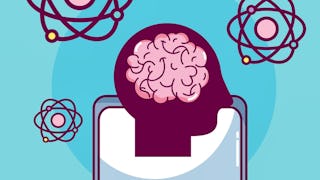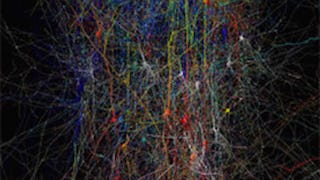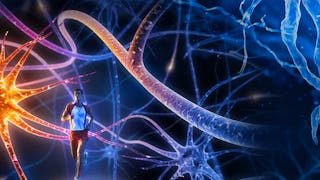Learn how the nervous system produces behavior, how we use our brain every day, and how neuroscience can explain the common problems afflicting people today. We will study functional human neuroanatomy and neuronal communication, and then use this information to understand how we perceive the outside world, move our bodies voluntarily, stay alive, and play well with others.


Understanding the Brain: The Neurobiology of Everyday Life

Instructor: Peggy Mason
400,191 already enrolled
Included with
(3,213 reviews)
Skills you'll gain
Details to know

Add to your LinkedIn profile
See how employees at top companies are mastering in-demand skills

There are 10 modules in this course
Neurobiology is a rapidly growing area of scientific research, and is becoming increasingly prevalent in the news and popular culture. In this course, we will study of the nervous system from a biological perspective by exploring the fundamental concepts in neurobiology, including how we sense the world, how we act in the world, and common neurological disorders.
What's included
17 videos3 readings1 quiz
Neurons are the cells of the nervous system responsible for communicating, relaying, and integrating information. Neurons "talk" to other neurons through a special type of language that involves electrical signaling within individual neurons, and the use of chemical compounds known as neurotransmitters to communicate between neurons. In this module, you will learn more about how a neuron functions at rest, how information is relayed within a neuron, and how neurons relay information to other neurons or target tissues. In the second half of this module, you will be learning about how the body and emotions work together to produce our everyday emotional experiences. We will look at the enteric nervous system and learn how to discern whether the sympathetic or parasympathetic system is impacting our current emotional state.
What's included
17 videos3 readings1 quiz
Neuroanatomy tells us how the nervous system is organized. Understanding the form of the brain is essential to understanding its function. By comparing the structure of the brain with a patient's symptoms, neurologists are able to identify the location of certain disorders. Studying how the human brain develops provides insight to why it is organized as it is. This module, you will learn about how the brain develops during gestation, some major pathways in the nervous system, and what can go wrong!
What's included
26 videos2 readings1 quiz
Perception is how the brain interprets incoming stimuli. Not all stimuli that can be sensed are perceivable, and sometimes those that can be perceived play tricks on us. The systematic ways that stimuli are interpreted (or misinterpreted) show how well the brain can understand our surroundings, sometimes with limited information. This module we will explore perception and vision.This module contains a lot of material, so be sure to start early so that you have time to finish!
What's included
26 videos3 readings1 quiz
The sound of birds chirping in the morning, a babbling brook or crashing waves on the beach, or warm conversation with the ones you love. The experience of all these things requires the ability to hear. Arguably the most important sense for human communication, it is also the most commonly impaired of our senses. In this module, you will learn how the human ear is artfully designed to enhance our ability to hear the human voice. You will follow sound waves as they travel from the external world, to the eardrum, through the bones of the middle ear, and to the cochlea that transduces sound information into neural impulses.
What's included
16 videos3 readings1 quiz
The vestibular system and gaze control give us so much but are grossly under appreciated. They are so fundamental that we discount them, assuming that they will always be there. When the vestibular system fails us, its importance dominates our lives. Living with either a vestibular or an eye movement disorder is very disruptive to everyday life. In this module, you will learn how the inner ear is designed to detect and respond to head movements. You will learn about the circuit that connects the inner ear to the motoneurons that control the location of your eyes, allowing us to reflexively maintain our view of an object even as we move about in the world. Finally, we will talk about how you can modify this reflexive control of the eyes and how you can control where you are looking.
What's included
16 videos2 readings1 assignment
"Voluntary movements are how we interact with the world. The organization of the motor system has implications for how we move, and the types of movements we can make. This module we'll start to explore the organization of the motor system, from neurons to muscles. This module contains a lot of material, so be sure to start early so that you have time to finish!"
What's included
18 videos2 readings1 quiz
You should now have an understanding of how muscles function to initiate movements. However, the brain requires more than just the cerebral cortex to determine what movements to perform and to make those movements smooth and guided. This module, we'll explore the cerebellum and the basal ganglia, fascinating structures that play a major role in movement. You'll also learn how these brain regions are involved in motor learning and disease.
What's included
19 videos2 readings1 quiz
Although our bodies are very robust and we can live in a range of environments, our brain requires very specific conditions to function properly. Homeostasis is the active process by which our nervous system regulates internal conditions, such as blood pressure and temperature. This module we will explore what homeostasis does, and how it functions in everyday life.
What's included
13 videos2 readings1 quiz
You've now learned an incredible amount about the way the brain functions to perceive and act upon the world we live in. You've gained an understanding of neurobiology on a cellular level, and how many diseases and disorders of the nervous system can affect our bodies and minds. In our final module, we will journey into the realms of emotion, attention, memory, and language. By the end of this module, you will have a greater understanding of the more abstract cognitive functions the brain.
What's included
18 videos2 readings1 quiz1 peer review
Instructor

Offered by
Explore more from Basic Science
 Status: Preview
Status: PreviewDuke University
 Status: Free Trial
Status: Free TrialJohns Hopkins University
 Status: Preview
Status: PreviewHebrew University of Jerusalem
 Status: Preview
Status: PreviewPeking University
Why people choose Coursera for their career




Learner reviews
3,213 reviews
- 5 stars
90.89%
- 4 stars
7.33%
- 3 stars
0.74%
- 2 stars
0.55%
- 1 star
0.46%
Showing 3 of 3213
Reviewed on Jun 22, 2020
I absolutely loved being a part of prof. mason's class! I have gathered alot of information that is going to help me build my future! And this course made me like neurobiology even more! Thank you
Reviewed on May 15, 2022
I benefited greatly from this course. I felt that Professor Mason was part of my family. It's great and her explanation is excellent. Thank you from the bottom of my heart professor mason.
Reviewed on Nov 26, 2022
I enjoyed this course. I took it as part of a requirement for a neurofeedback certifocation (non-degree) and I appreciated Dr Mason’s ability to make the science applicable to every day life.

Open new doors with Coursera Plus
Unlimited access to 10,000+ world-class courses, hands-on projects, and job-ready certificate programs - all included in your subscription
Advance your career with an online degree
Earn a degree from world-class universities - 100% online
Join over 3,400 global companies that choose Coursera for Business
Upskill your employees to excel in the digital economy
Frequently asked questions
To access the course materials, assignments and to earn a Certificate, you will need to purchase the Certificate experience when you enroll in a course. You can try a Free Trial instead, or apply for Financial Aid. The course may offer 'Full Course, No Certificate' instead. This option lets you see all course materials, submit required assessments, and get a final grade. This also means that you will not be able to purchase a Certificate experience.
When you purchase a Certificate you get access to all course materials, including graded assignments. Upon completing the course, your electronic Certificate will be added to your Accomplishments page - from there, you can print your Certificate or add it to your LinkedIn profile.
Yes. In select learning programs, you can apply for financial aid or a scholarship if you can’t afford the enrollment fee. If fin aid or scholarship is available for your learning program selection, you’ll find a link to apply on the description page.
More questions
Financial aid available,
¹ Some assignments in this course are AI-graded. For these assignments, your data will be used in accordance with Coursera's Privacy Notice.